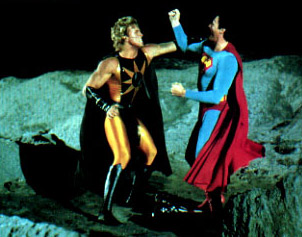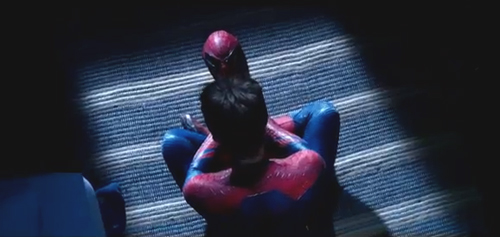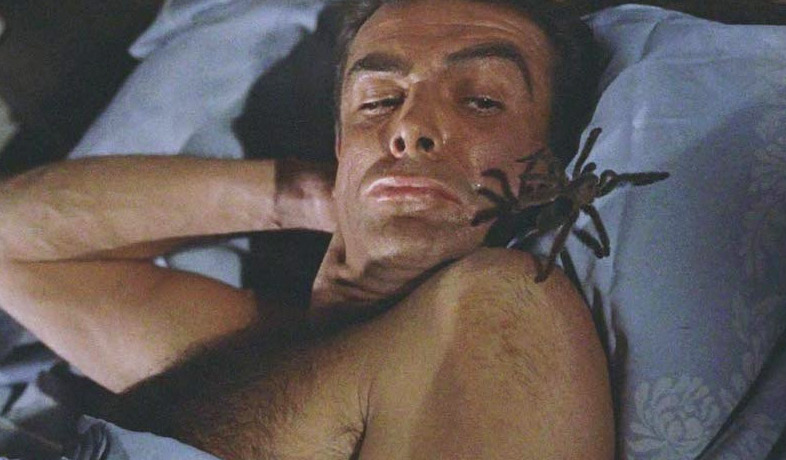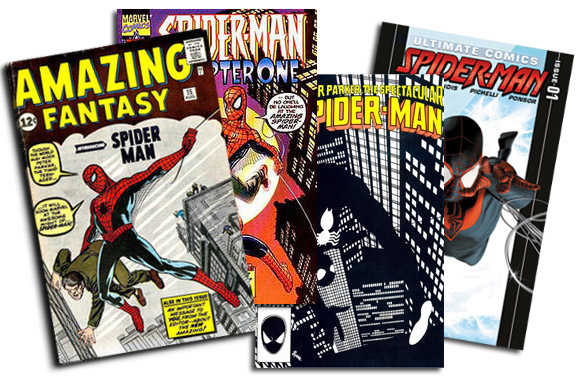Burning Questions: What's Wrong With An Instant Reboot?
 Tuesday, July 3, 2012 at 1:00PM
Tuesday, July 3, 2012 at 1:00PM  Michael C here to get Spidey's back this Fourth of July.
Michael C here to get Spidey's back this Fourth of July.
There used to be a natural life cycle for big movie franchises. It began with audiences thrilling to the sight of Christopher Reeve soaring over Metropolis and ended a few films later with everyone looking away in embarrassment as Superman traded punches with Nuclear Man on the moon. This was followed by a period of mourning long enough for everyone to wonder if the last film was some kind of fever dream, and then and only then could a fresh creative team breathe life into the dormant franchise.
But now, no sooner does Emo Spidey cha-cha his way into an early grave, than the suits decide to shake the etch-a-sketch on the whole show and pretend the last three films never happened. In a world fast approaching franchise over-saturation, with sequels dropping with a frequency normally reserved for Tetris blocks, the idea of a hugely successful series starting over from scratch while the body of the last entry is still warm, feels like a new low in shameless cash-grabbing.
 Time for a new actor to don the mask
Time for a new actor to don the mask
But take a step back for a moment, put emotions on hold and ask the logical question: What is so bad about an instant reboot?
The most common refrain in the wake of the reboot announcement was “Why do we need a retelling of Spiderman’s origin?” Not exactly a fair question since the wisdom of making a movie can only truly be decided in hindsight. How many people thought we really needed a sequel to The Addams Family before we got a great one? A fresh, entertaining take on the material justifies its own creation, same as with any film, reboot or otherwise.
I sympathize with those fans who worry that too many versions of a single story dilutes the power of each individual telling. But when you are dealing with properties that have been around for decades and decades like Spiderman or James Bond, or even longer like Robin Hood, there is no point in getting precious about it. Varied takes on the character having kept them going this far and will keep them going into the future, and that's all there is to it.
 James Bond and Spider-Man. Or... Uh. James Bond and Spider.
James Bond and Spider-Man. Or... Uh. James Bond and Spider.
Rebooting a property certainly does less violence to a film’s legacy than a terrible sequel or various competing director’s cuts, or –shudder - a digitally “improved version”. Take Bond. No amount of invisible cars and ice fortresses could ever spoil my enjoyment of Goldfinger. Craig and Connery stand side by side in my estimation without one intruding on the other’s cinematic territory. Likewise, rebooting Spider-man whole cloth allows the Raimi trilogy to stand on its own while a new creative team gets a crack at the character.
And on the subject of Spidey, isn’t this exactly what the comic books have been doing for ages? Restarting and doubling back over the same material, allowing different artists to apply their own voice? Why should movies be limited to one interpretation per generation? Why should one dud entry like Superman IV or Batman and Robin bury a beloved character for a decade or more? Why not just let the studios swing away and let film audiences do what the comic fans do – celebrate the successes and let the passage of time wipe the failures from memory.

Of course I haven’t made the best case against immediate reboots: the case for originality. The position that Hollywood should just drop the franchises altogether - be they sequels, prequels, reboots or whatever - and cultivate original ideas. But that is an argument for an idealistic flight of fancy. As far as dealing with the reality of Hollywood as it stands where the sequels continue to come 2 fast and 2 furious I have a hard time justifying some sort of polite waiting period before new blood can get pumped into a film series.
So that's my best argument for reboots. An argument I'm surprised to find myself making. Am I right to find no real harm in the practice or am I whistling past the graveyard as this trend drags down the popular culture? Let me know in the comments.
You can follow Michael C. on Twitter at @SeriousFilm or read his blog Serious Film.
 Bond James Bond,
Bond James Bond,  Burning Questions,
Burning Questions,  Spider-Man,
Spider-Man,  remakes,
remakes,  sequels,
sequels,  superheroes
superheroes 


Reader Comments (14)
You're right when it isn't your beloved franchise getting a quick and cheap reboot.
Indeed, they do it in the comics...and we hate it when they do it, too. If there's a different origin, then it's a different character and all the stuff that came before is naught but a dream. It's the _Dallas_-style way of getting yourself out of the corner you painted yourself into.
When they took Superman's powers away and made him based on electricity, it was a complete fiasco and they quickly fixed it. The rejiggering of Wonder Woman's origins hasn't gone over too well, either.
When Sony came up with the new Spiderman, they rejiggered his powers such that his webshooters were biological rather than technological. Why? Well, trying to pass off Tobey Maguire as a top-notch chemistry student might have seem a bit far-fetched, even for a superhero movie, but there was no point to it. That said, there's no point in starting over again.
How many times do we need to see the origin of the Hulk?
My own objection to superhero reboots particularly is that their origin stories take so damn long to tell that unless handled extremely well, it uses up too much of the movie to set up the pieces, and then there's no time left over for summertime fun; hence the first X-Men, or going to the extreme, Green Lantern.
I have never understood what's wrong with the approach of the Batman Forever / Batman & Robin or Superman Returns route: same continuity, new director and actor. That all three of the films were poor-to-freakishly-dreadful is more of an accident than something inherent in the idea.
Couple of reasons:
1. It avoids telling other stories. In the comics, between re-telling the origin from time to time, actual stories are told. Stories with plots that aren't the origin or some kind of Just So Story about How the Wolverine Got His Claws. The absence of such stories sucks the life out of the superhero genre.
2. It disrespects the immortality of the movies. We live in the very same world as Martin Scorsese and other obsessive film preservationists. Meanwhile, a 10 year-old Spider-Man movie has apparently ceased to exist. Movies matter because they matter, and there's a difference between "reboot" and "that other thing didn't exist."
[I have never understood what's wrong with the approach of the Batman Forever / Batman & Robin or Superman Returns route: same continuity, new director and actor. That all three of the films were poor-to-freakishly-dreadful is more of an accident than something inherent in the idea.]
The poor quality is never accidental when the purpose is to milk a dying cow. The Burton Batman's are a lovely China cup tossed to pieces for the sake of continuing.
The difference with Bond is they don't tell the exact same story in the "reboot"; each change of actor doesn't then show how he became 007. If this was just a new Spider-Man film I'd be a lot more excited than having to watch his Uncle get murdered again. It's just too soon.
Yeah, you can't compare Spidey to Bond. With each new Bond, it's not a reboot; it's the same character (though some would dispute that) in a completely new story. I never went to see the Raimi Spiderman movies in theaters, but I enjoyed them at home, and I just don't see a reason to tell the same story (or a version of it) again, let alone go see it.
"Instant Reboots" as you call them are Hollywood at its most crass, plain and simple. They are disrespectful to the audience who invested money and time in the original films (not to mention the makers and stars of those films), and reek of desperation and the desire for a quick, easy dollar, not to mention a lack of imagination and/or creativity.
denny: I'm hoping Spider-Man doesn't get rebooted again, yes. Yet, I think this series might have the tie-in video games fit inside their continuity. And, well, if you play the tie-in game, it shows what the direction for Marc Webb's films might be.
A reboot and a retelling of an origin are two different things. For movies, a reboot is a good idea if it means bringing fresh talent to a character. But it doesn't follow that every reboot has to retell the origin, or even that the first film in a series has to tell the origin. X-Men did all right without really being an origin story. If a character is familiar, why not start over while taking how the character came to be for granted? Won't it be recognized as a reboot otherwise? Warner Bros. will probably have to reboot Batman after The Dark Knight Rises, but will the first post-Nolan film really have to retell the origin again? FYI, DC Comics published Batman stories for nearly a year before getting around to telling his origin, and he still caught on. Given how familiar Batman is now, a reboot really ought to be able to hit the ground running. Similarly, let there be many movie versions of Spider-Man, but not so many origin movies.
I'm curious as to what some of you posters who say it's the origin story that's the problem actually want? The last trilogy had really painted itself into a corner of ridiculousness and plot warpedness. The new team couldn't just continue where the last one left off. What a joke that would have been. So their only option was to start over with their own creative vision. Unfortunately, Spidey origin stories all have similar starts. So what was Sony's options. Make shit up and have your own origin? Just start at some random place where Spiderman has powers with no setup? I just don't get how a certain amount of time would have made this more palatable and Sony's certainly not just going to say, "well, there goes Spiderman." I think people are being silly and a bit stupid about the whole thing, but if you need to get upset about something, go right ahead.
Samuel: I think comic books and movies are two very different mediums. With respect to X-Men, it had the benefit of being an ensemble piece and not really focusing on one character. Even still, it referenced a couple of characters' origins. Follow ups did so with even greater focus on Wolverine's. I just don't know any modern franchise that managed to reboot without at least referencing the origin. Don't say Bond, cause the last Bond reboot to not do so was in the mid nineties, and even Goldeneye had a sort of Best Friend Spies Forever turned adversaries backstory to start it up. Also Bond has no "official" origin so filmmakers can do what they want without backlash.
@DrewB
There was a time when studios made indirect sequels. What does that mean? It means you can continue a franchise with a new cast, new director, and a new vision without completely wiping the slate clean. Everybody knows how Parker becomes Spider-man. Raimi's film is only 10 years-old and it's still on TV a few times a year.
On top of that, if you're going to retell the origin, bring something new to the table like Nolan did for Batman (though in fairness, Batman's origin had never seen the big screen). The Amazing Spider-man is incredibly lacking in creativity or originality, as it's almost beat for beat the same as the 2002 film (even the villian, despite being a different character, is essentially the same corporate scientist turned sympathetic Jekyll/Hyde figure who talks to himself). It's actually quite insulting to audiences that Sony thinks we'll just forget about a movie that's still fresh in our brain.
When it comes to superhero movies or any franchise, if the origin has been done and done well, don't do it again. Why did it work for Batman, Bond, and Star Trek? Because none of those had their origins on the big screen before. Spider-man has.
I was sceptical of the new Spidey film, but then it went and did things better than the first Spider-Man (and obviously better than the third). Nothing will stop Spider-Man 2 from being one of the very best superhero movies ever (it's my #2 behind "Batman Returns"), but I liked the new one so I'll take it.
I mostly agree with you, and I think 4rtful made a good point that the concepts Batman Forever and Superman Returns weren't as problematic as the executions.
My problem with reboots coming too soon is that reboots, especially in the comic book world, have a very specific purpose, and that's to introduce the characters to a new generation of readers with new tastes, styles, themes, issues on their minds. If Batman stayed Adam West-style and never got the Frank Miller reboot, we'd all be going to see Ice Age 12 in a few weeks. Spider-man has his own unique set of problems (Sam Raimi jumped a decade in Peter's life over the course of 3 movies, the rights for the franchise were about to lapse, the third movie sucked, etc.) so the reboot makes sense in a logical way, but simply not enough time has passed to give Spidey a unique generational voice and vision, and I think that's what people are picking up on.